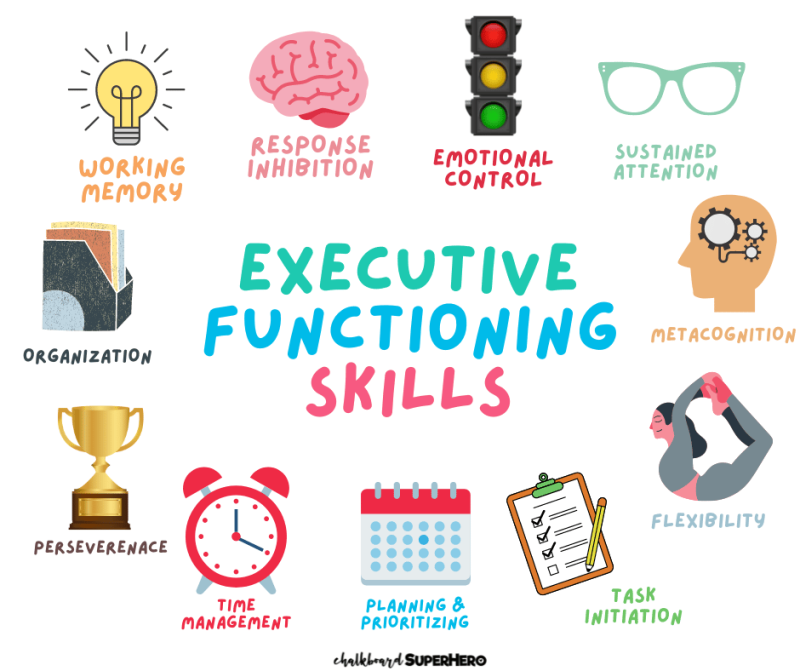
Executive Functioning Summary
Executive functioning refers to a set of cognitive processes that enable individuals to plan, focus attention, remember instructions, and manage multiple tasks effectively. These skills are essential for goal-directed behavior and emotional regulation. Executive functioning is often linked to the prefrontal cortex and includes key abilities such as organization, time management, emotional control, impulse regulation, and flexible thinking.
In a mental health therapy practice, addressing executive functioning is particularly beneficial for clients experiencing challenges such as ADHD, anxiety, depression, or trauma. Impaired executive functioning can manifest as difficulties with prioritizing tasks, maintaining focus, managing emotions, and completing daily responsibilities. Therapy can help clients develop strategies to strengthen these skills, ultimately improving their mental health and quality of life.
Therapists working on executive functioning often use techniques like cognitive-behavioral therapy (CBT) to address thought patterns and problem-solving skills. Interventions may include goal-setting, mindfulness exercises, time-blocking strategies, and visual organization tools. Additionally, therapy may focus on improving self-awareness and emotional regulation to reduce impulsivity and enhance decision-making.
By targeting executive functioning, mental health practitioners empower clients to better navigate their personal, academic, and professional lives, fostering long-term growth and resilience.
Benefits of Using Group Counseling for Executive Functioning
Group counseling for executive functioning is an effective approach for fostering skill development, peer support, and real-world practice in a structured environment. Here are the key reasons to use group counseling for executive functioning:
1. Peer Learning and Support
- Shared Experiences: Participants often feel validated and less isolated when they realize others face similar challenges with organization, time management, and emotional regulation.
- Modeling Behavior: Group members can observe and learn from peers who successfully implement strategies to improve executive functioning.
2. Real-Time Practice of Skills
- Social Interaction: Group settings provide opportunities to practice communication, collaboration, and conflict resolution, which are critical aspects of executive functioning.
- Problem-Solving in Groups: Participants can brainstorm solutions together, building flexible thinking and teamwork skills.
3. Accountability and Motivation
- Built-In Accountability: Group members encourage and hold each other accountable for applying strategies learned in sessions.
- Increased Engagement: Knowing they will report progress to the group often motivates participants to stay on track.
4. Cost-Effectiveness
- Group therapy is often more affordable than individual sessions, making it accessible to more participants while still delivering effective interventions.
5. Exposure to Diverse Perspectives
- Group members bring unique experiences and insights, enriching the learning process and encouraging creative approaches to managing executive functioning difficulties.
6. Emotional Regulation in a Safe Environment
- Practice Managing Emotions: Participants can practice emotional regulation strategies in a controlled setting when facing frustration or stress during group activities.
- Feedback and Support: Constructive feedback from peers and the facilitator helps participants refine their skills and build confidence.
7. Structured Skill Development
- Groups can follow a curriculum designed to systematically teach and reinforce executive functioning skills, such as time management, task prioritization, and organization.
8. Encourages Self-Awareness
- Group discussions help participants reflect on their behaviors, recognize patterns, and set realistic goals for improvement.
By fostering a collaborative, supportive environment, group counseling for executive functioning not only builds critical cognitive and emotional skills but also enhances participants’ confidence and ability to apply these skills in everyday life.

